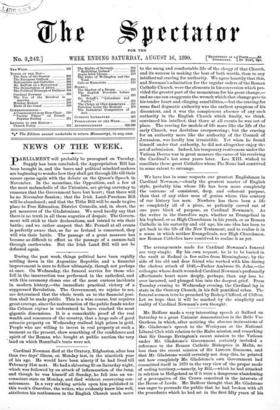Cardinal Newman died at the Oratory, Edgbaston, after less than
two days' illness, on Monday last, in the ninetieth year of his age. He would have been ninety if he had lived till February 21st next. He had a shivering fit on Saturday night, which was followed by an attack Of inflammation of the lung, and though he was himself all Sunday, he fell into an un- conscious state on Monday, and died without recovering con- sciousness. In a very striking article upon him published in this week's Guardian, the writer, who evidently knew him well, attributes his restlessness in the English Church much more
to the smug and comfortable life of the clergy of that Church, and its success in making the best of both worlds, than to any intellectual craving for authority. We agree heartily that this, and Newman's admiration for the regular orders of the Roman Catholic Church, were the elements in his conversion which pro- vided the greater part of the momentum for his great change,— and no one can exaggerate the wrench which that change gave to his tender heart and clinging sensibilities,—but the craving for some final dogmatic authority was the earliest symptom of his discontent, and it was the conspicuous absence of any such authority in the English Church which finally, we think, convinced his intellect, that there at all events he was out of place. The craving for models of life more like the life of the early Church, was doubtless overpowering ; but the craving for an authority more like the authority of the Council of Jerusalem, was hardly less irresistible. Yet when he found himself under that authority, he did not altogether enjoy the act of submission. Indeed, his temporary restiveness under the Vatican Decree was in great measure the cause of his receiving the Cardinal's hat some years later. Leo XIII. wished to conciliate those great Catholics whom Pio Nono had contrived to some extent to estrange.


































